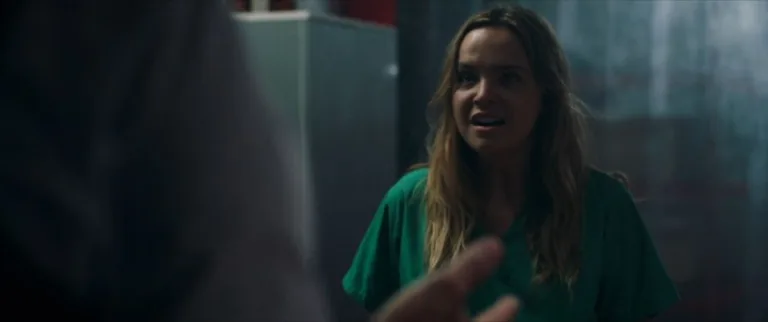The Twin (2024) Ending Explained - Is The Fetch Real?
Welcome to Knockout Horror. If you are new here, we review horror movies, explain horror movie endings, and put out horror movie ranking lists. Today, I am going to be knocking out another horror movie plot – The Twin Ending Explained.
Look, I am not going to lie. I wasn’t an enormous fan of this movie. It felt extremely generic, fairly derivative, and I am getting a bit tired of the whole “horror “monster as a metaphor for trauma” thing. With that being said, there are a few touching moments, here and there. I do think some people will really enjoy the almost 2000’s style of horror, as well.
I really believe that there is a concrete explanation for this movie but there are a few narrative missteps that make it a bit confusing so let’s clear that up. As always, I am going to recap the film then answer a few questions. I’ll be talking a lot about mental illness and sensitive subjects in this article, just as a forewarning.
As always, if you haven’t watched The Twin yet you will want to skip this article as it contains spoilers. Our review, however, is completely spoiler free so read that first. Remember, this is just my interpretation of the ending. Yours may be completely different. Let’s take a look.
A Recap of The Twin
The movie kicks off with our protagonist, Nicholas (Logan Donovan), as a child barricading his door and trying to stop his Grandmother entering the room. This hints at Nicholas’ harrowing childhood with an abusive matriarch. Fast forward to the future, Nicholas is now a dad to a young boy named Jacob (Tripp Toupal).
Unfortunately, after promising to help his son bring a large pumpkin downstairs, he gets caught up painting. This leaves his son to bring the pumpkin down the stairs on his own. The only problem is that Nicholas hasn’t tied Jacob’s shoes. Jacob falls down the stairs and passes away. After the funeral, Nicholas attempts to take his own life due to the grief and guilt that he feels.
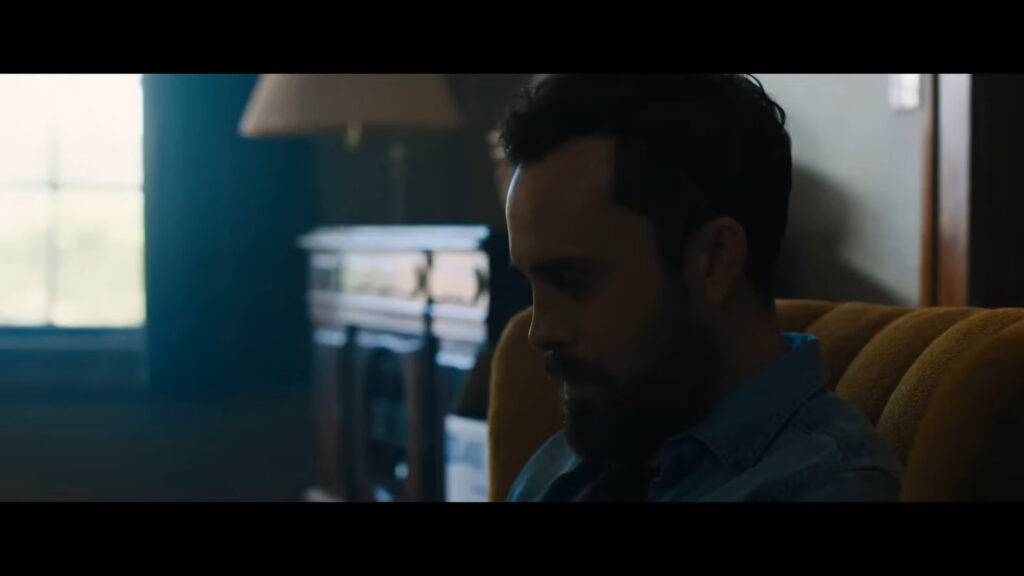
After a stint in a psychiatric facility, Nicholas is released and his wife takes him to his childhood home. They are planning to sell the house and his wife, Charlie (Aleksa Palladino), believes they need space from each other. She tasks Nicholas with packing boxes and engaging in his outpatient treatment plan while she stays in the other home. This plan also involves daily check-ins with a psychiatrist with some unusual techniques such as hypnotism.
On his first meeting with the psychiatrist, Dr. Beaumont (Robert Longstreet), Nicholas relates how he feels ambushed. He is angry and reluctant to engage but knows that he must if he wants his wife back. He is prescribed Escitalopram, an SSRI anti-depressant. This seemed a bit strange to me as I am sure he would have been prescribed in the hospital and already routinely taking medication.
Back In The Childhood Home
Nicholas gets back to painting, attempting to complete a portrait of his late son. His nights are plagued with nightmares, however, and he is struggling to live with his grief. Dr. Beaumont tries to relate to Nicholas by telling him about how his daughter had taken her own life three years before. We see the first instance, here, of Nicholas hearing voices insulting him as if the words are coming from the people he is chatting to.
Nicholas also suffers from a panic attacks while out shopping for groceries and sees visions of his dead grandma tormenting him. We learn from the neighbour that the night his grandma died, Nicholas had ran to her house. He could barely talk besides uttering the words “grandma” and “fetch”. When they entered the house, it was smashed up and not the home of someone who had simply had a heart attack.
As Nicholas and Dr. Beaumont have a heart to heart, we learn that Nicholas didn’t intend to try to take his own life. He wasn’t in control and remembers nothing. It was him who cleaned up the blood from Jacob falling, though, because he believed it was his responsibility. He has now been seeing things, hearing things, and struggling to sleep. When he does sleep, he has nightmares.
Nicholas Has Forgotten Jacob’s Face
Obviously, Nicholas is feeling tremendous guilt over his son’s death. Dr. Beaumont shares that he also feels guilty over the death of his daughter because he was working on the night she took her own life. That night just so happened to be Christmas Eve. He suggests the pair have some guy time later with pizza. Nicholas agrees.
Later that day, Nicholas sees a disturbing distortion on the painting of Jacob. He checks the photos he has of his son and his face has disappeared from all of them. Hearing the sound of the show Jacob was watching before he died, he heads downstairs only to see Jacob sitting in front of the television. Before he can talk to him, Nicholas see a monstrous version of himself burst through the window.
Eventually snapping out of it, he realises he is actually alone in the house. The face being gone from the photos is symbolic of Nicholas having forgotten the face of his son, likely as a trauma response. But what about the vision of himself that he saw breaking through the window?
What is The Fetch?
In a meeting with Nicholas’ wife, Charlie, Dr. Beaumont elaborates on what he thinks Nicholas is experiencing. He believes that Nicholas is seeing his Fetch. The Fetch dates back centuries in Irish folklore. It is said to be a supernatural double of a person. Apparently, seeing your double is an indicator of your own impending death.
A more common version of this story that Americans may be more familiar with is that of the Doppelgänger. A German folklore being that, again, is seen as a spectral double of the person and is an indicator of impending bad luck.
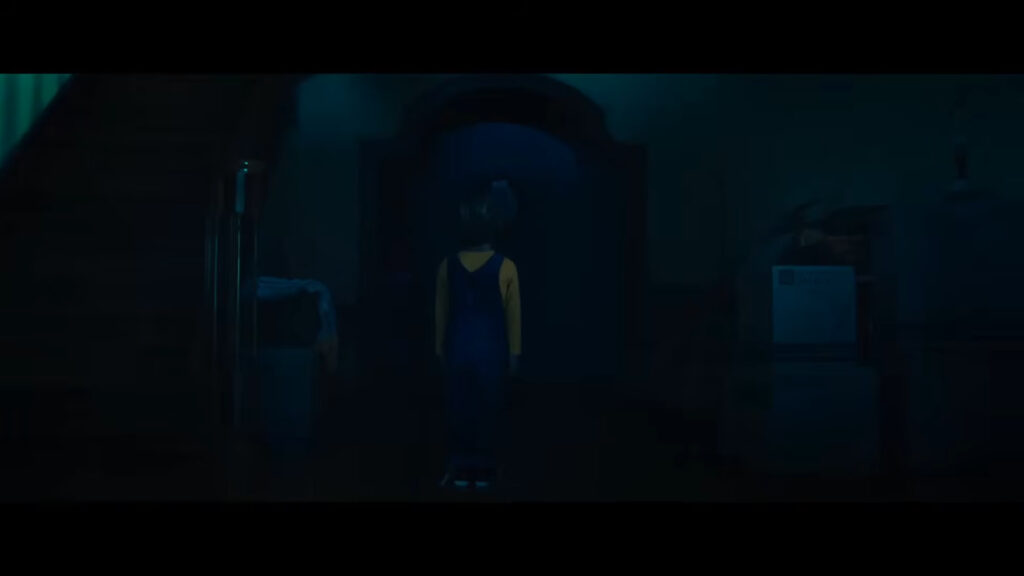
Nicholas read the story of the fetch as a child. After his grandma pleaded with him for help while suffering a heart attack, Dr. Beaumont believes that, inspired by the stories, Nicholas manifested the idea of the fetch. Rather than help her, he believed that his grandma had been replaced by her evil double. He ran to his neighbour’s house and his grandma passed away.
Dr. Beaumont believes that Nicholas suffered a trauma response as a result of Jacob’s death. This trauma response awakened the concept of the fetch back in his mind and that he is hallucinating his own double. He also believes that this is due to schizophrenia as all the symptoms line up. Hallucinations, self harm, disturbed sleep, etc. Dr. Beaumont believes this is a good news as Schizophrenia is treatable with the correct medication and therapy.
Nicholas Is Going Through It
While Dr. Beaumont and Charlie have been chatting, Nicholas has not been having a great time. He has been in a vicious battle with his fetch. Nick has attempted to smash his head against the table to stop the thoughts and he has been battling the Fetch’s urges to take his own life. He still has time for pizza, though, so that’s cool.
Dr. Beaumont has two new medications for Nicholas: the anti-depressant Trazadone and Clozapine. Clozapine is a bit of a “when all else fails” medication for treating schizophrenia so I doubt they would start a potential patient on that.
As someone with bipolar disorder, I can tell you there are a whole bunch of other anti-psychotics that they will throw at you first. Doctors more commonly prescribe Olanzapine, Risperidone, and even Quetiapine for newly diagnosed patients. It doesn’t level out your moods, either. Its purpose is to bring patients out of episodes of psychosis.
If they want this dude to sleep better, just give him that Quetiapine and call it a day. It won’t be the fetch that Nicholas is battling with, then. It will be horrible restless legs and the most caffeine resistant morning tiredness ever. Nicholas downs both the “Sleeping Pills”, even though Trazadone isn’t a sleeping pill, before Dr. Beaumont decides to hypnotise him against his will.
If we are keeping score, he has now prescribed him numerous different medications without consultation, diagnosed him with schizophrenia after a few meetings, and has now hypnotised him against his will. I am not sure it is the fetch that Nicholas should be worrying about. It’s Dr. Beaumont’s flagrant medical malpractice.
Nicholas Is Hypnotised
During the hypnosis, Nicholas sees his grandma tormenting him on the night she passed away. He then sees his fetch who, once again, tries to push him to take his own life. Strangling him and trying to push him over the stairs in the process. Nicholas fights back, scratching the fetch. When he snaps out of the hypnosis, Nicholas is on the stairs having been close to jumping off.
Dr. Beaumont embraces him while Nicholas cries about having forgotten his son’s face and how Jacob’s death was his fault and his wife hates him. Dr. Beaumont comforts him before taking him upstairs and absolutely yeeting him onto the bed.
At this point, the Dr notices that Nicholas actually has skin and blood in his fingernails and a mark around his neck from fighting the Fetch. It suddenly dawns on him that this might not all be in his head, after all. He contacts Charlie and tells her that he is staying the night with him but that she needs to visit tomorrow.
Charlie’s Concerns Grow
Charlie arrives the next day. Things seem better with Nick but she is concerned about the bruises on his neck and arms. When they embrace, it is clear that Nick is still hearing voices and he sees his fetch in the distance. When the neighbour visits with her grandson, Nick embraces the child thinking it is Jacob and tries to take him indoors. This scene made me laugh more than it should. Especially when she smacks him around the head so he will put the child down.
Indoors, Charlie confronts Nick about the fetch and tells him the doctor thinks he is experiencing hallucinations. He complains about them sharing notes about him but that’s how it goes with a serious mental illness, I am afraid. It’s kinda dehumanising when you are at your worst. Nicholas then sees his fetch again. As he contorts in agony and tells Charlie to leave, Charlie’s attention lands on the falling mirror across the room. She then abruptly leaves.
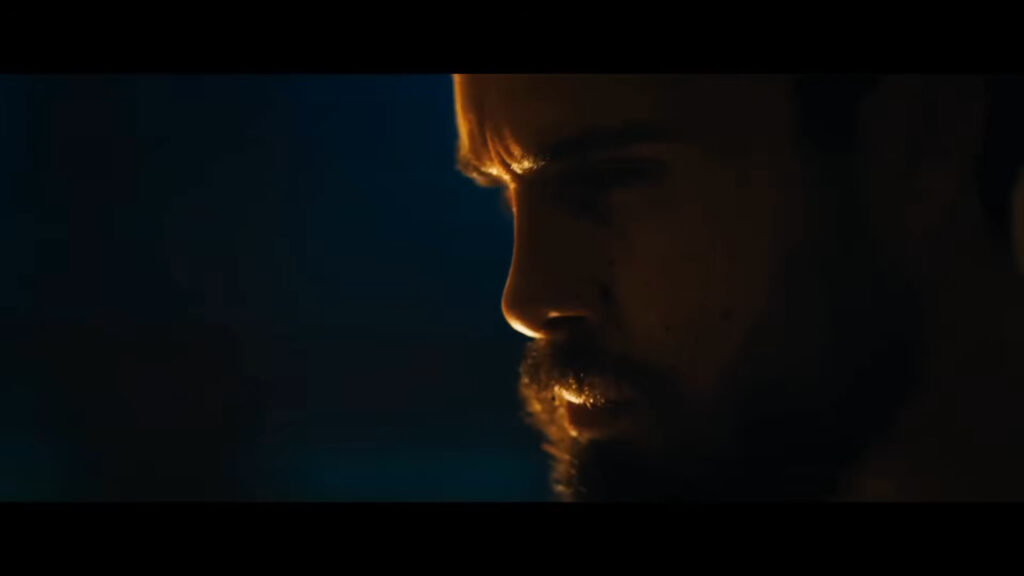
Nicholas frantically searches the room for his wedding ring as that has been the thing giving him the power to fight back against the fetch. The fetch’s tormenting continues and it seems as though another arm is pushing through Nicholas’ skin, as if the fetch is trying to escape his body. Meanwhile, Charlie calls the doctor and he agrees to meet her at the farm. When they arrive, they realise the rope from around the tree has gone so they rush inside.
The Final Battle
Entering the house, the pair see disturbing paintings scattered around. The walls have also been covered in black paint. Nick calls to the pair but is pulled away by a hand. The fetch has separated from his body and now has a seemingly physical presence. It has a hold of Nick and, when the doctor tries to tell Nick it is all in his head, it drops him and attacks the doctor before turning on Charlie.
Nick taunts the fetch which then turns its attention towards him. Nick grabs it, pulling the fetch back into his body by agreeing to take his own life. He tells Charlie to leave. She pleads with him to fight but he tells her he doesn’t know how. The doctor tries a different approach, tormenting Nick and telling him to just do it, hoping this forces the fetch to drop its guard.
Nick climbs onto the chair and puts the noose around his neck. The doctor then hypnotises Nick and instructs him to relate what he is seeing. Nick sees Jacob and follows him up to his room, he turns him around but he can’t see his face due to not being able to remember it. Charlie realises that she needs to help him so grabs a photo and describes Jacob to him.
Nick suddenly remembers his son’s face. He has a chance to tell Jacob he loves him before sending him off to play. Nick then finds the fetch and kills him before the doctor brings him out of hypnosis. Fast forward to a few months later, Nick is doing a lot better and him and Charlie have finished packing the house. He has also finished the painting of Jacob. Nick and Charlie embrace but the Nick’s reflection seems to have a double which looks on sinisterly.
Explaining the Ending
There’s a couple of key things that factor in when explaining the ending of The Twin. This is one of those movies that wants to be two different stories. It wants to be an actual horror story with a supernatural monster but it also wants to be an allegorical horror story with a metaphorical monster. It’s part supernatural, part psychological but which one is dominant?
We have the suggestion that, at times, other people are aware of the fetch. Charlie and the doctor seem to see it when Nick is pulled away from them at the end and then they are both, apparently, attacked by it. Director J.C. Doler wants to keep the viewer off base and uses a fair bit of narrative misdirection to do that.
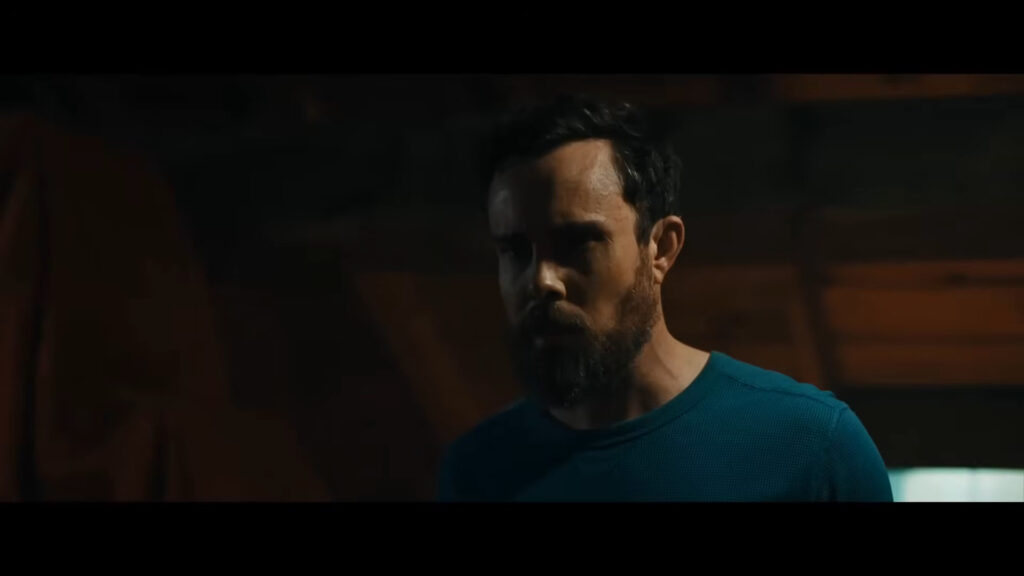
While this is a supernatural story about a demon haunting the protagonist, its main focus is on the horrors of grief. It is also a story about childhood trauma, familial mental illness, and the loss of control that comes with psychosis. That leads us on to an important question.
Was The Fetch Real? – The Psychological Explanation
Yes and no. Believe it or not, this is actually really difficult to concretely explain because the ending is a bit poorly written. The truth is, Doler wants the movie to be both things but takes a few missteps while attempting some delicate narrative misdirection.
I believe that Doler wanted it to go a little something like this. Keep in mind, we have a lot of suggestions that Nick had a bad childhood. His parents were gone and his Grandma seemingly suffered from mental illness and wasn’t a great carer. He has bottled this childhood trauma up and it has been brought back up to the surface by the death of his son. A death which he blames himself for, and even cleaned the blood from which would have been dramatically traumatising.
The movie often hints at hereditary mental illness, as well. Just like how some people refer to addiction as “The Demon” or to mental illness as some other term that avoids directly referencing it. The fetch was Nicholas’ mental illness. It was passed down from his grandma who had her own fetch. As related by Nick on the night she died.
Was Nicholas Schizophrenic or Suffering from PTSD?
Nicholas has been displaying a mental health profile that suggests the possibility of schizophrenia or extreme PTSD.
- Disturbed sleep or even no sleep at all
- Dissociation
- Relentless and disturbing nightmares
- Self harming
- Attempts to take his own life
- He is suffering from both auditory and visual hallucinations
- He is experiencing disrupted thought patterns
The fetch was very real to Nicholas in that it was a manifestation of his grief, his CPTSD, and his unresolved trauma. He actually saw it, it was compelling him to violence, and it was haunting him. At least in as much as it was a symptom of his psychosis.
The symptoms are all there and even some of the less obvious bits can be explained by it. For example, he says that he has no memory of trying to take his own life but that could be a product of Dissociative Amnesia. A condition which causes memory lapses during traumatic moments. Him having no memory of his episodes of staring out of the window could also be a result of this.
He also said he had no desire to take his own life but that is often an impulsive act, not a calculated one. Especially when suffering from psychosis. A big component of psychosis is having no awareness that what you are doing is dangerous or damaging. As well as being ruthlessly impulsive. Again, I have experienced this with my bipolar disorder.
The fetch wasn’t real to the other people in the film, though. The fetch was a symbolic representation of Nick’s mental illness. It was, essentially, possessing Nicholas and making him harm himself and others. A rare symptom of schizophrenia and even PTSD; auditory and visual hallucinations driving sufferers to commit violent acts that would, otherwise, be against their usual nature.
When Nicholas kills the fetch, he is killing the part of him that is suffering from grief, mental illness, and trauma. He does that by confronting that very grief. Nick hanging the fetch, or the twin, is symbolic of his overcoming the problems he is going through.
Was It Just Nicholas All Along?
When Charlie and the Doctor enter the house at the end of the film, they are confronted by Nick, not the fetch. Nick then attacks them before finally experiencing a moment of lucidity, realising what he is doing and stopping. This is when the doctor hypnotises Nick to help him battle the fetch in his mind. In other words, to directly confront his internal, unresolved trauma and grief.
The problem is, this goes against some of the stuff we actually see happening in the film. We actually see the fetch choking Charlie. This is where I believe the desire to actually make this a horror movie comes in. This was an attempt at narrative misdirection. While trying to make the film feel more like a horror movie, Doler decided to opt for an actual physical manifestation of the fetch. I mean, it wouldn’t really be a horror without a monster, right?
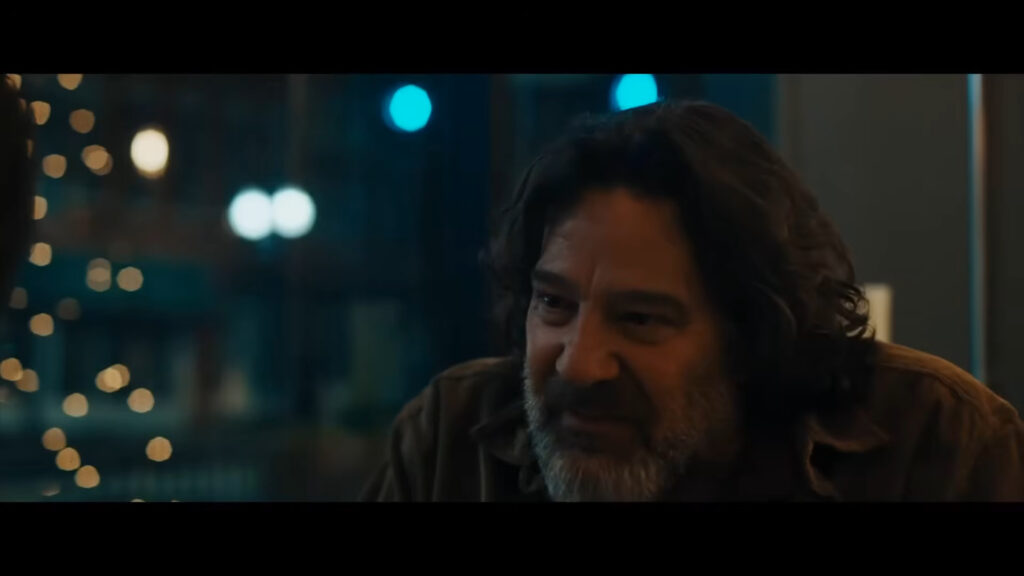
Despite the fact that we see the fetch, it was Nick who was attacking them, all along. The fetch is a visual representation of Nick during his psychotic state. Remember how we talked about hereditary mental illness? This exact same thing happened to Nick’s grandmother. She attacked Nick one night and smashed up the house due to an episode of psychosis. Before she could harm Nick, she succumbed to a heart attack.
Charlie saying that this isn’t real as the fetch chokes her is purely because she knows that Nick isn’t in his normal state of mind and is mentally unwell. This is why she doesn’t make much effort to fight back, she knows he won’t hurt her. The key to this being the actual explanation is something that Nick, himself, says. Remember how the fetch had thrown the doctor and he hit his head?
Once Nicholas had finished his battle with the fetch while under hypnosis. Nicholas apologises to the doctor for hurting him. The doctor tells him it’s okay and he will get him back when he least expects it before laughing. This suggests that it was Nicholas, not the fetch, that hurt the doctor and both of them are aware of that.
Nick Was Very Ill
With all of the above facts considered and ignoring the one random bit of narrative misdirection. We can make the assumption that Nick was suffering from psychosis due to severe mental illness. He attacked the doctor and Charlie. Nick then snapped out of it long enough to stop before the doctor hypnotised him. Nick then, along with the help of Charlie, confronted his grief directly by saying goodbye to his son, one last time.
We then see the fetch in the mirror, in the final shot, looking back at Nick as a symbolic representation of how his grief and mental illness will always be there and he will always be battling it. I genuinely believe that this is what Doler was going for with this story. A tender tale of grief, unresolved trauma, and mental illness. The only problem is, in his attempt to misdirect the viewer and to tick the horror quota, he leaned too far into the horror itself.
None of this is out of the ordinary, either. Childhood trauma can become a problem later in life. That’s exactly what CPTSD is. Losing a child often results in parents attempting to take their own lives or suffering from PTSD. Traumatic events can also bring about the onset of a condition like Schizophrenia that, otherwise, may have stayed dormant until a little later in life.
The constantly reinforced point throughout the movie is that Nicholas needs to confront his grief. He needs to deal with his unresolved trauma. Forgetting Jacob’s face is a normal part of grief but Nicholas isn’t ready to forget yet because he never faced the loss directly. He already feels like he caused Jacob’s death and forgetting his face makes him feel like he was even more of a failure. This is a simple story of loss told through a horror lens.
Was The Fetch Real? – The Supernatural Explanation
This explanation is a lot more simple. If we are to assume that the fetch was real, then everything you see actually happened. The fetch was something that had been haunting Nicholas since he was a child. It was passed down to him by his Grandma. Nick had managed to contain it but the grief of losing his son brought it back to the surface.
The fetch compelled him to attempt to take his own life but he survived thanks to Charlie’s intervention. The fetch kept pushing Nicholas and weakening him until he could no longer contain it and it escaped his body. The same thing happened with his Grandma years before who had also been battling to contain her own fetch. As she grew physically ill, the fetch escaped and attacked Nick.
When Charlie and the doctor arrived, the fetch attacked them both before Nick regained his strength. He recaptured the fetch and finally defeated it while hypnotised, partly by confronting his grief so that he wouldn’t be burdened by it anymore. Meaning he could focus all of his attention on the fetch. The fetch looking back in the mirror at the end was a reminder that Nick will always be fighting to contain the fetch. What you see is, very much, what you get.
It’s Up To You!
Honestly, that last explanation is pretty boring. I much prefer the mental illness allegory but the narrative missteps make it a bit messy. The truth is, it is hard to do horror with a metaphorical monster without occasionally seeing the monster. It still has to be a horror film at the end of the day and it still has to have scares. My conclusion is that the fetch was symbolic of Nick’s mental illness and unresolved trauma. The reason we see it and it attacks Charlie is because it would be a bit boring otherwise. Thanks for reading and spending your time at Knockout Horror.
Disclaimer: Images, posters, and video stills used in this horror ending explained article are the property of their respective copyright holders. They are included here for the purposes of commentary, criticism, and review under fair use. Knockout Horror makes no claim of ownership and encourages readers to support the official release of all films discussed.
Do You Want Me To Explain a Horror Ending?
Know a horror movie with a confusing ending? Suggest it below and I might explain it. The more suggestions for the same film, the more likely I am to explain it.









